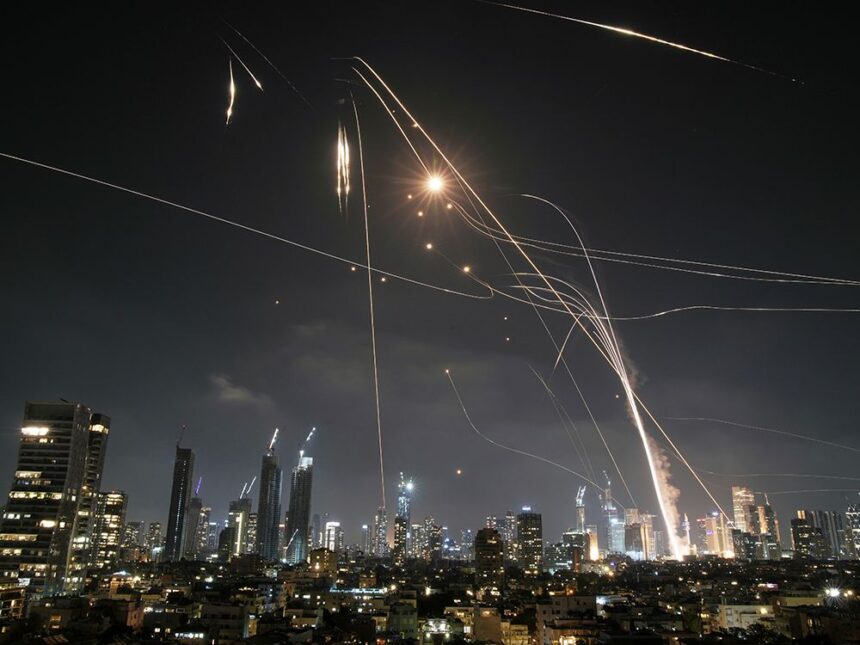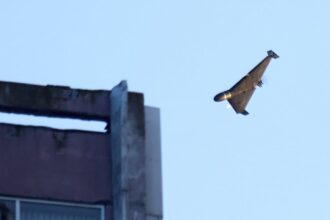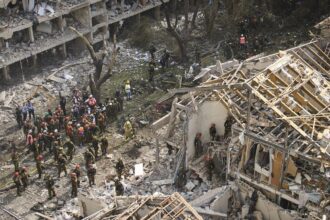The night sky over Israel transformed into a battlefield of lights Tuesday as Iran launched approximately 180 ballistic missiles toward Israeli territory—a dramatic escalation in the ongoing Middle East conflict that threatens to engulf the region in broader warfare.
Israel’s sophisticated multi-layered air defense systems, operating with crucial American support, successfully intercepted most incoming projectiles, according to Israeli military officials. The Israel Defense Forces reported that while the majority of missiles were neutralized mid-flight, some impacts were recorded across central and southern regions, causing limited damage and several injuries.
“What we witnessed was an unprecedented direct attack from Iranian soil against a sovereign nation,” said defense analyst Michael Horowitz, who specializes in Middle East security affairs. “The scale of this assault represents a significant threshold crossing in regional hostilities.”
The missile barrage came in response to Israel’s military operations in Lebanon and Gaza, with Iranian officials describing it as retaliation for the killing of Hezbollah leader Hassan Nasrallah and other high-ranking officials. Tehran’s state media characterized the attack as a legitimate exercise of Iran’s “right to self-defense.”
U.S. President Joe Biden convened an emergency National Security Council meeting as the attacks unfolded, subsequently announcing accelerated deployment of additional American air defense assets to the region. “The United States stands unequivocally with Israel,” Biden stated from the White House. “We are providing real-time intelligence and defensive capabilities to our ally.”
The successful interception demonstrated the effectiveness of Israel’s multi-tiered missile defense architecture—including the Arrow system designed specifically to counter ballistic missiles at high altitudes, Iron Dome for shorter-range threats, and David’s Sling for medium-range projectiles. Military experts note that this integrated system, developed with substantial American funding and technological cooperation, proved its worth during this most severe test.
Dr. Emily Landau from the Institute for National Security Studies in Tel Aviv emphasized the significance of this defensive achievement: “What we’re seeing is the real-world validation of decades of investment in missile defense technology. The systems performed remarkably well considering the volume and sophistication of incoming threats.”
International reaction came swiftly, with G7 nations issuing a joint statement condemning Iran’s actions while urging restraint from all parties. United Nations Secretary-General António Guterres called for “immediate de-escalation” and warned that the region stands “at the brink of a catastrophic widening of the conflict.”
Oil markets responded nervously to the developments, with Brent crude prices jumping nearly 4% in early trading as investors weighed the potential for disruption to energy supplies should the conflict expand to include key oil infrastructure in the Persian Gulf.
The missile exchange marks the second direct military confrontation between Iran and Israel this year, following an April drone and missile attack that was launched after an Israeli strike on Iran’s consulate in Damascus. Military analysts suggest this latest escalation represents a significant intensification in both the scale and directness of Iran’s approach.
As Israel weighs its response options, the international community faces critical questions about containment strategies. Regional stability now hinges on whether diplomatic channels can prevail over military escalation. The effectiveness of Israel’s defensive shield may have prevented immediate catastrophe, but the fundamental question remains: can the spiral of retaliation be broken before it leads to all-out regional war?























